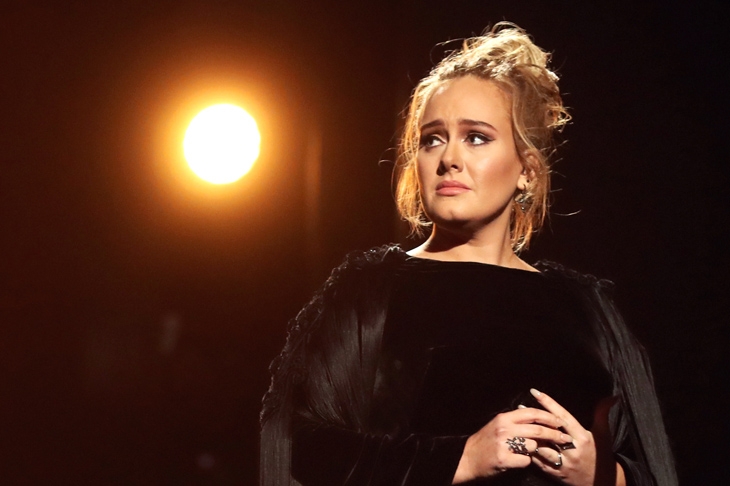Truman Capote should have been called Truman Persons. His father, Archulus, abbreviated his first name and introduced himself as Arch Persons. ‘And that,’ scoffed his son, ‘sounded like a flock of bishops.’ The young scribbler was thrilled when his divorced mother married a rich Cuban, Joseph Capote, whose zippy and eccentric name he gladly adopted. He got a job at the New Yorker and found the magazine’s celebrated wits, including Dorothy Parker and James Thurber, were embittered molluscs who hated each other. Capote’s literary life, as related by Bob Kingdom, is a parade of inspired bitchiness. He had the knack of getting to a character’s core problem. For Gore Vidal it was the knowledge that he had never written a masterpiece. Marilyn Monroe simply lacked the ability to give or to receive love. Capote was never better than when peering behind fame’s mask to encapsulate the disappointments of success. ‘Who gave him wings to soar,’ he wrote, ‘took away the sky.’
Dane Baptiste’s lugubrious, lilting comedy outlines his belief that we live in a polytheistic society ruled by abstract and personal deities. We pay homage to intangibles like money and banking and we revere household gods in the form of the royal family. This sounds like revolutionary Marxism but Baptiste delivers his theory with a light touch; wryly, inclusively, even approvingly. He’s a middle-class insurrectionist. His Catholic upbringing has left him with a priestly temper and he ends his hour-long sermon with a request that we hold each others’ hands and ponder the truths he has delivered. A new low at the festival! To spare my neighbour the ordeal of clasping my sweaty mitt I told her I was carrying a skin fungus related to leprosy. She grabbed it anyway.
Adele Is Younger Than Us is a quirky cabaret show by two songwriting comediennes who mock themselves for being less successful than their heroine, Adele. They might be characters from a flatshare sitcom. Rhiannon is posh, cerebral, supremely English and a little reserved, while Sally is a twinkly down-to-earth colleen from Cork. Their material is tailor-made for comedy clubs but it may never reach beyond the bounds of the circuit. Converted into a musical this show might have a longer life and a larger audience.
The Fall is a verbatim piece set on a campus in Cape Town. The students are hopping mad. And rightly so. Their society is ruled by a corrupt and distant elite that refuses to share wealth and opportunity with the dispossessed. The students decide to act but they make two blunders. First, they misidentify the enemy as their ‘colonial heritage’. Secondly, they persuade themselves that their best tactic is to deface historic emblems. A march is organised and a lot of shouty protestors gather to unseat an effigy of Cecil Rhodes. This makes the elite quake with laughter rather than fear. In fact, had the elite devised a means of neutralising the students they could hardly have come up with a better method than a campaign against a Victorian fossil. The students consider their march a success when Rhodes has been deplinthed and roughed up a bit. But the elite remains in place, invulnerable and untouched. What’s more, as one of the students points out, the elite now has the freedom to damn the protestors as dangerous law-breakers.
Having smashed up the bronze antique, the rebels seek new scuffles to fight. The male students are attacked as ‘paternalists’ and held responsible for South Africa’s rape culture by their female victims. Then a fresh policy is announced. All tuition fees must be scrapped. A strike is declared. The entire campus will close. But hang on, asks somebody with a brain cell, will student doctors have to stop treating patients in hospital? ‘Yes they will.’ And the students score another own goal. The elite can now characterise them as a gang of psychotic ideologues willing to endanger the lives of the sick in order to get a free college education. I watched this noisy and tiresome display in despair and disbelief. It could almost be a hyper-real satire on failed activism. These barmy students are clueless about power and entirely lacking in imagination or cunning. They’re not really engaged in politics at all but in exhibitionist aggro-mongering. Their children and grandchildren will have to secure the privileges they let slip through their fingers.
The fringe is full of great but neglected comedians. Kate Smurthwaite is one of the wittiest gun-slingers I’ve ever seen on stage. The Beeb uses her sparingly, but because she’s an ‘activist’ she’s limited to feminist radio shows and the odd Question Time slot. They haven’t realised that she can cover the full spectrum from crunchy political interviews to live prime-time comedy. Is there anyone else at TV centre who could take over from David Dimbleby as well as Graham Norton? Odd that she’s been missed.







Comments